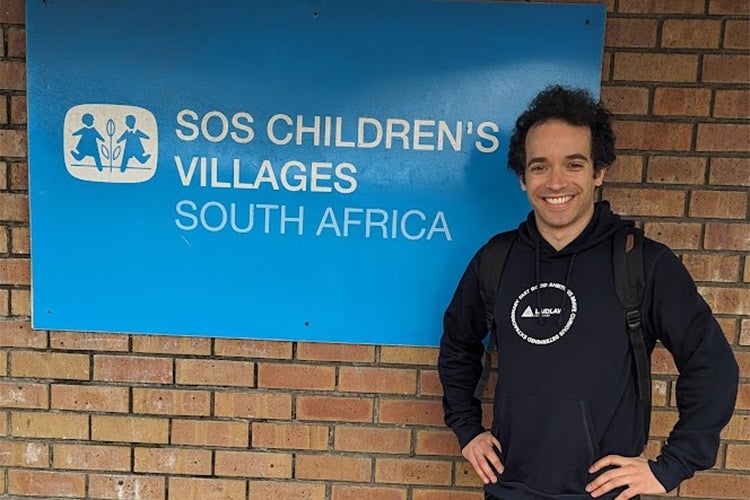Having never taken the conventional path, Youness Robert-Tahiri is determined to support children who have experienced adversity - using an unexpected tool: comedy.
He believes it can help them build resilience and develop coping skills.
"I grew up in an abusive household and became homeless in high school trying to escape it," says Robert-Tahiri, who is graduating from the University of Toronto with a bachelor's degree in psychology. "Making people laugh helped me cope with what was happening in my life.
"Then in my 20s ... I committed to therapy and started to really understand how my upbringing affected my mental health."
Before returning to school in his 30s, Robert-Tahiri spent a decade as a comedian and theatre actor. His entry point was an audition for a high school play, encouraged by his teacher Michelle Vingada - who remains one of his mentors. To his surprise, he landed the lead role and discovered a passion that led him to theatre school in New York City. He specialized in performing and teaching improv comedy, later honing his skills back in Toronto at Bad Dog Theatre Company and The Second City Toronto.
Today, he's a burgeoning scientist who values curiosity and creativity.
"U of T has an impressively comprehensive psychology program and the quality and variety of research opportunities available are unmatched," says Robert-Tahiri, a member of Woodsworth College.
During his studies, he worked as a research assistant in Professor Jessica Sommerville's Toronto Early Cognition Lab in the department of psychology in the Faculty of Arts & Sciences, as well as in the lab of Amanda Sharples, an assistant professor, teaching stream. He also worked as a research assistant in Professor Becky Chen's Multilingualism and Literacy Lab at the Ontario Institute for Studies in Education (OISE).
"I started connecting the dots between comedy and psychology, exploring how humour could help kids work through trauma."
With guidance from Ruth Speidel, assistant professor of developmental psychology and managing director of the Centre for Child Development, Mental Health, and Policy at U of T Mississauga, Robert-Tahiri designed a comedy-based mental health program for children. It combines psychological themes with improv exercises to help kids facing adversity build confidence and emotional regulation skills.

With support from the Laidlaw Foundation, he piloted the project last summer with orphaned, abandoned and precariously housed youth at SOS Children's Villages in South Africa.
"In the program, there are psychoeducational components where we discuss concepts like hostile attribution bias and empathy. I'll ask kids, 'Why did your character feel that way? What does it remind you of in your own life?'" says Robert-Tahiri. "This is where acting comes in as a tool for reflection and understanding."
He likens leading scientific research to directing a play - whether it's working with a standardized method, referencing a script, analyzing data or assessing feedback.
"Experimentation is what it's all about, in science and in art - you don't have to know every little step all the time. What's important is keeping an open mind and seeing where it leads."
Throughout his time at U of T, Robert-Tahiri looked for more ways to give back. He volunteered as a mentor with the Woodsworth College Students' Association Mental Health and Equity Committee and the Psychology Students' Association, among others.
"I want to help students take advantage of the unique experiences that I've had during my undergrad," he says. "One of my most fulfilling experiences was a global mental health Summer Abroad course in Athens, Greece, which opened my eyes to different ways of healing, and scaling up interventions."
As a mature student, Robert-Tahiri brought a unique perspective to his friend group, most of whom are in their early 20s.
"Some of my friends struggle with balancing what they should do and what they want to do," he says. "My advice to students who are figuring out their path is to keep that path flexible - and follow your interests."
It's the same advice that his high school mentor Vingada gave him years ago when he needed direction.
"Youness has this innate drive in him to find a way to make other people's lives better," Vingada says. "I'm so in awe of the genuine, positive person he's become."
After his convocation, Robert-Tahiri is heading back to Cape Town for the summer to continue working with SOS Children's Villages and mentor other Laidlaw scholars. He then plans to teach abroad for a year before pursuing graduate studies in clinical psychology and expanding his trauma-informed comedy program.
Robert-Tahiri says the lessons he's learned from improv continue to guide him.
"Improv is about possibility. It teaches you to say, 'Yes, and …' - to take risks and get outside your comfort zone. That's where the real growth happens."






